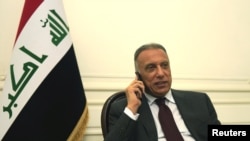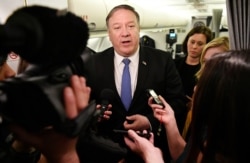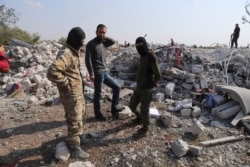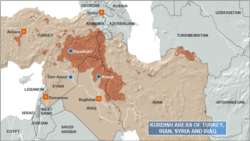Before he held political office, Iraq’s recently elected Prime Minister Mustafa al-Kadhimi was a strong critic of his predecessors for turning the country into “Iran’s backyard” in the eyes of other nations.
“A strong, coexisting and cohesive Iraq is the option that will best serve Iraq’s long-term interests,” he wrote in 2013 when Nouri al-Maliki was Iraq’s premier, in an op-ed for Al-Monitor, a U.S.-based website.
“However, this cannot occur until the regional and international parties that consider Iraq nothing more than Iran’s backyard are convinced otherwise by the enactment of more independent policies [by the Iraqi government],” al-Kadhimi added.
Al-Kadhimi’s election this month was welcomed by both the United States and Iran, raising questions about whether the new leader could maintain what appear to be mutually exclusive relations, as the U.S. continues to impose crippling sanctions on Iran.
The U.S. immediately granted another 120-day waiver for Iraq to continue importing gas and electricity from Iran “as a display of our desire to help provide the right conditions for success,” according to a statement from the U.S. State Department.
Secretary of State Mike Pompeo called al-Kadhimi, promising him U.S. support.
“I pledged to help him deliver on his bold agenda for the sake of the Iraqi people,” Pompeo said in a tweet last week.
Pro-Iran militia
In his first week as prime minister, al-Kadhimi issued a decision to free all the anti-government protesters who had been arrested by the previous administration to the displeasure of the U.S.
He also directly went after a militia group accused of killing protesters and closed the office for Thar Allah, or God’s Revolution, a pro-Iran militant group, in Basra.
"Kadhimi’s priority is much needed damage control caused by Adil Abdul-Mahdi’s tenure,” said Bilal Wahab, an Iraq expert at the Washington Institute for Near East Policy, referring to the previous premier. It includes “deeper militia infiltration and activity, Iraq’s regional and international isolation due to Baghdad’s closeness to Tehran, and seeking accountability for the brutal crackdown against the protesters,” he told VOA.
Before assuming office, al-Kadhimi was the director of Iraq’s National Intelligence Service, an organization that under his stewardship played a critical role in the territorial defeat of the Islamic State (IS) terror group in Iraq.
“National intelligence, he has reformed it very well,” said Abbas Kadhim, an Iraq expert with the Atlantic Council, adding that al-Kadhimi turned the intelligence service into a more effective and apolitical institution that cooperated with rival countries, such as Saudi Arabia, Iran and the U.S., on counterterrorism matters.
“He was credited with providing critical information to the U.S. that led to the killing of [IS leader Abu Bakr] al-Baghdadi,” he added.
Sectarianism stance
Experts argue that sectarian policies practiced by Iraq's Shiite leaders following the 2003 U.S.-led invasion of Iraq contributed to the rise of the Islamic State terror group.
Al-Kadhimi was critical of sidelining Iraqi Sunnis under a policy called “de-baathification,” which sacked public servants who used to have ties to the former Baath Party.
In his past statements before assuming the office of the prime minister, al-Kadhimi said there should not be a sweeping edict applied to all.
“What applies to the Baath Party should not apply to the Baathists as individuals,” al-Kadhimi wrote in an article about year before IS took Iraq’s second-largest city, Mosul.
"Everyone in Iraq agrees that a set of pressures, compromises and ambiguities forced millions of Iraqis to join this party, which reduced the state and linked all of its aspects to the party,” he added.
Irbil-Baghdad ties
Kurdish officials announced Wednesday that al-Kadhimi agreed to reverse his predecessor’s decision that halted the revenue share of the Kurdistan Regional Government (KRG), which is estimated at nearly $400 million, according to local media.
The news was cheered by the public in the northern Kurdish region, where public school teachers protested over the weekend because they had not received their last paychecks.
“This is great news,” Nahro Zagros, an Irbil-based university professor and an expert on Iraqi politics, told VOA. “One has to realize that when [al-Kadhimi] was first nominated to the government, Kurds were the first group to endorse him to become the prime minister of the country. So, he is returning the favor now.”
The Iraqi government has yet to announce any new decision vis-a-vis the outstanding budget dispute with Irbil, which essentially is caused by fundamental disagreements over the right to sell the country’s natural resources.
US alliance
In the past, al-Kadhimi viewed the United States as an indispensable ally of Iraq, while advocating for more balanced relations with Iran, America’s longtime foe.
“There is no doubt that Iraq is in dire need of intensified support and backup by the United States, as a strategic ally in the fight against IS,” al-Kadhimi said.
Some experts assert the reality of Iraqi politics dictates that any leader of this majority-Shiite nation remain a loyal ally of Iran, regardless of one’s visions for the country.
"Previous prime ministers were not Iranian puppets when they started their job” said Zagros, the Irbil-based analyst. “They became Iranian puppets because they had no power to resist Iranian influence in Iraq.”







